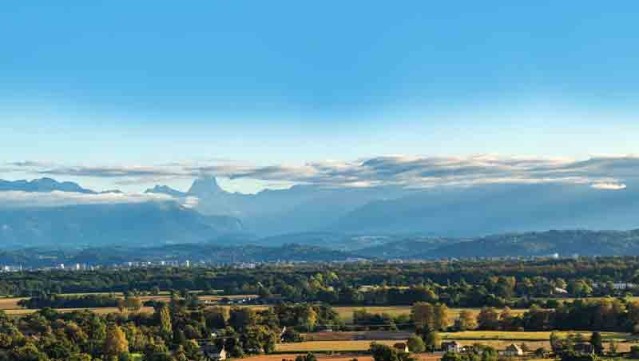The University chooses the environmentA unique experimental power in the territory

30/06/2020
The University of Pau and the Pays de l'Adour (UPPA) is renowned for the excellence of its training, equipment and research in the field of energy and environmental transition. It is providing itself with the means to build a better and more respectful future for natural resources in the region.
An experimental river to study fish in their natural environment, a platform devoted to coastal hydrodynamics in extreme conditions, experimental tools dedicated to the thermal treatment of waste and biomass... The list is long of the state-of-the-art equipment available at UPPA in the field of energy and environmental transition. Gathered in the twenty or so thematic platforms forming the UPPA-Tech instrumental services centre, these facilities make up an experimental powerhouse that is unique in the region, conducive to innovation and to the university's international influence.
The excellence of the teaching staff and the training courses, coupled with the quality of the equipment, contributed to the award in 2017 of the label ''Initiatives Science, Innovation, Territories, Economy'', one of the actions of the future investment programme. This prestigious label, endowed with substantial resources, confirms the ambitious strategy pursued by the university as part of its E2S-UPPA project: ''Solutions for Energy and the Environment''. E2S-UPPA aims to further strengthen our areas of excellence, particularly in the geosciences and energy, and to consolidate our environmental skills," says Isabelle Baraille, vice-president of the UPPA research commission. This increase in power is based in particular on the opening of new, rare and specialised training courses, such as the Master's degree in bio-inspired materials which will open at the start of the next academic year, as well as on the recruitment of the best teacher-researchers, both in France and abroad.
A lasting attraction
The opening in 2019 in Anglet of the HPC Waves (High Performance Computing of Waves) Chair of Excellence , headed by Volker Roeber, is emblematic of this desire to combine very high-level research with local issues. A specialist in the numerical modelling of waves, internationally recognised for his expertise, Volker Roeber is now working on modelling the coastal waves of the Basque coastline. His ambition? To move towards real-time analysis of coastal risks.
Susana de Matos Fernandes, who was recruited at the end of 2018 to hold the new MANTA (Marine materials) chair in biomimicry, is also one of those rare gems that enable the university to explore new fields. Specialising in the study of natural polymers, the researcher exercised her talents in Portugal, Spain and Sweden before joining UPPA. She is now designing revolutionary biomaterials that have no impact on the marine ecosystem. Her arrival with Palois researcher Laurent Billon, who has been developing materials inspired by the animal and plant world for several years now, also heralds the birth of an exceptional centre dedicated to biomimicry on the Basque coast, IPREM Ocean, combining research, training and partnerships.
Excellence at the service of the territory
Furthermore, it is by developing international partnerships, by forging links with prestigious universities or the most remarkable laboratories, that UPPA intends to reconcile excellence and local roots. The NEW PORES (New frontiers in porous materials) international hub, built with the American university Northwestern with the aim of developing applications relating to the security of CO2 storage, bears witness to this ambition.
The international MacLife laboratory (Management and climate impacts on freshwater ecosystems), involving the University of California at Berkeley, the Spanish University of the Basque Country (UPV-EHU) and the UMR ECOBIOP (Behavioural ecology and biology of fish populations) in Saint-Pée-sur-Nivelle (INRAe/UPPA), is part of the same logic. A sustainable strategy, which can be reduced to a formula: "Think global, act local".